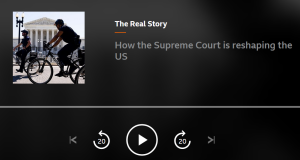RADIO (BBC): How the Supreme Court is reshaping the US
Abortion, environmental protections and gun ownership rights are among the controversial topics the US Supreme Court has ruled on over recent weeks. The highest court in the land has the final say on interpreting laws and deciding what’s constitutional and what isn’t. Now – with a clear conservative majority at the helm – the court’s move to overturn the landmark 1973 ruling guaranteeing abortion rights across the country (Roe v. Wade) signals it’s willing to re-visit previous judgments many had considered ‘settled law’. Campaigners fear past decisions on other subjects, such as gay marriage, the right to contraception and even the way elections are run, may now also be overturned. So, what is the role of the Supreme Court within the United States’ system of government and is it changing? How will its rulings impact politics federally and in individual states? And is the system set up by America’s founding fathers working as designed, or is political polarisation undermining the very principles it was built around?
Contributors
Jonathan Turley – The Shapiro Chair of Public Interest Law at George Washington University
Elizabeth Wydra – President of the Constitutional Accountability Center, a think tank based in Washington DC
Randy Barnett – The Patrick Hotung Professor of Constitutional Law at the Georgetown University Law Center and Faculty Director of The Georgetown Center for the Constitution
Jack Rakove – The Coe Professor of History and American Studies and Emeritus Professor of Political Science at Stanford University

